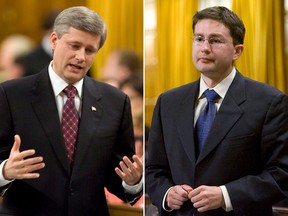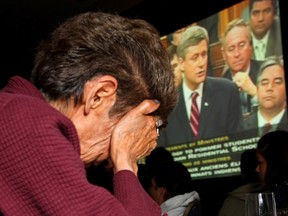Book excerpt: Poilievre ‘went soul-searching’ after making one of the biggest mistakes of his political career as Harper was about to apologize for residential school abuses

Article content
This is an excerpt from Pierre Poilievre: A Political Life by Andrew Lawton (Sutherland House.) It tells the 2008 story of how Poilievre, as an MP and parliamentary secretary, was dressed down by Prime Minister Stephen Harper for an ill-timed political gaffe.
Article content
Pierre Poilievre’s second term was marred by what remains one of the biggest mistakes of his political career. It’s hard to find a criticism of him that doesn’t reference his ill-worded comments in a radio interview hours before Prime Minister Stephen Harper delivered a formal apology to former students of Canada’s Indigenous residential school program.
Advertisement 2
Article content
The apology, delivered June 11, 2008, was the product of years of negotiation between the Canadian government and residential school survivors going back to the previous Liberal government. In a class action settlement, the government had committed at least $1.9 billion in “common experience payments,” allowing any living Indigenous person who had ever been at a residential school to claim at least ten thousand dollars, regardless of whether they endured any specific harm or abuse.
Although the settlement had been promised by his predecessor, Paul Martin, it wasn’t clear when Harper came to power in 2006 whether the Conservative government was bound to the commitment. As the Harper government weighed its options, there was vigorous internal debate. Many members of the Conservative caucus, particularly those in the West, objected to the common experience payment, pointing to stories from people who said they had benefitted from residential schools and had positive histories with them. Despite these misgivings, Harper thought the legally and politically wise course was to honour the agreement rather than resetting the years-long negotiations to zero. Some caucus members were displeased.
Advertisement 3
Article content
By the time of Harper’s apology in 2008, the compensation and healing package had grown to four billion dollars. Many concerns still existed within the caucus. Hours before the apology, Poilievre gave an interview with Steve Madely of the Ottawa radio station CFRA and weighed in on the compensation:
“That gets to the heart of the problem on these reserves where there’s too much power concentrated in the hands of the leadership and it makes you wonder where all of this money is going. We spend ten billion dollars—ten billion dollars—in annual spending this year alone. . . .
“Now, that is an exceptional amount of money, and that is on top of all the resource revenue that goes to reserves that sit on petroleum products or sit on uranium mines or other things where companies have to pay them royalties and that’s on top of all that money that they earn on their own reserves. That is an incredible amount of money. Now, along with this apology comes another four billion in compensation for those who partook in the residential schools over those years. Now, you know, some of us are starting to ask, “Are we really getting value for all of this money, and is more money really going to solve the problem?” My view is that we need to engender the values of hard work and independence and self-reliance. That’s the solution in the long run. More money will not solve it.”
Article content
Advertisement 4
Article content
Separate from the residential schools apology, much of what Poilievre said would be uncontroversial in Conservative circles. He spoke about the path to prosperity for Indigenous communities and tapping into their natural resource wealth rather than simply getting transfers from the government. He also alluded to leadership corruption, which the Conservatives would eventually address with the First Nations Financial Transparency Act. But with the residential school apology hours away, Poilievre’s comments were spectacularly tone-deaf and ill-timed. Whatever his intentions, the only part of the interview anyone shared or remembered was Poilievre questioning the “value” of compensating residential school survivors and making a push for Indigenous people to learn about “hard work.” His interview filled news reports, undermining Harper’s apology and allowing opposition parties to attack the Conservatives at a time when they were hoping for unanimity. Behind closed doors, the hammer came down hard on Pierre Poilievre.

The next day, Harper “dressed him down so sharply that people outside the room were embarrassed,” according to one account in the Globe and Mail. “His face was flushed, as if he’d brushed away tears. Ministers avoided Mr. Harper’s gaze.” The meeting was tense enough for a couple of people to speculate that Poilievre may have felt his political career was over, or at least that he was on thin ice.
Advertisement 5
Article content
Ian Brodie, Harper’s chief of staff at the time, suggests the prime minister’s harsh response might have been proactive more than reactive. Because of the tensions surrounding the common experience payment and other aspects of the settlement compensation, Harper feared a “caucus revolt,” says Brodie. “That was a big, big, big moment. Harper had already told caucus, ‘Look, there’s going to be pieces of stuff that not everybody’s going to be happy with, but I’ve decided we need to do this in order to get onto other things. We’ve got to draw this issue to a close.’”
The caucus dynamics, says Brodie, were more difficult than the external politics of the issue. “It’s not that Pierre wasn’t speaking for a good chunk of the Western caucus in particular, including the guys he’d been elected with in 2004 who were not happy with the common experience payment,” Brodie says. “I think everybody understood that there was unhappiness in caucus and, God knows, unhappiness in the PMO about setting a precedent for something like the common experience payment, but it was the threat that the whole deal was going to come apart if it looked like we had a caucus revolt on this.”
Advertisement 6
Article content
While Patrick Muttart, Harper’s deputy chief of staff, recalls the controversy as relatively short-lived, one of many “gaffes or media controversies” that happen “when you’re managing a big, diverse caucus,” there is no doubt the episode caused political difficulties for the government. It fed media impressions of Conservative politicians as negative and extreme. Brodie thought Poilievre came across as the “worst stereotype of campus conservative.”
He was so deeply affected by it, and he really went soul-searching for a few weeks
Poilievre’s infraction could well have seen him bounced as John Baird’s parliamentary secretary. His contrition and introspection appear to have saved him. The day after Harper’s apology, Poilievre issued one of his own. He was the last MP to speak in the period allocated for member statements immediately before question period. While he was directed to make the apology, it was, by all accounts, genuine and heartfelt. “Mr. Speaker, I rise today to offer a full apology to Aboriginal people, to the House and to all Canadians,” he said. “Yesterday, on a day when the House and all Canadians were celebrating a new beginning, I made remarks that were hurtful and wrong. I accept responsibility for them, and I apologize.”
Advertisement 7
Article content
One former aide to Poilievre says that, despite Harper’s concerns about a caucus revolt, Poilievre wasn’t trying to kick a hornet’s nest with his comments and didn’t think what he was saying would generate controversy. “I’m sure he had thought about what he was going to say—I don’t think it was an off-the-cuff comment, but I do not believe that he appreciated how controversial it would be,” the aide says. “That was a learning moment.”
Colleagues say Poilievre took it upon himself to do private outreach to Indigenous people and groups in the aftermath of his failure in judgement. Perversely, Poilievre’s riding association saw a surge in donations the week of his comments from constituents who supported what he said in the CFRA interview, even though he’d apologized.
Opposition parties raised the Poilievre controversy in question period after his apology, but fortunately for him, the Liberals were far more interested in a juicier scandal involving the foreign affairs minister, Maxime Bernier, who had left confidential materials at the home of his biker gang-connected girlfriend, Julie Couillard. Bernier had resigned from cabinet a couple of weeks earlier, but the media interest in the story was keeping it alive, providing a convenient distraction from Poilievre’s mistake.
Advertisement 8
Article content
While his misstep soon disappeared from public view, it weighed on Poilievre personally. What followed was a “rough period,” say his colleagues. Poilievre wasn’t punished by the party or put in the “penalty box,” but he was kept out of the question period rotation and the limelight for a time so as to not put chum in the water for the media, says Jay Hill, then the Conservatives’ chief whip. Hill characterizes the approach as “Let’s not put him in the gun sights of the opposition for a few days. Let things cool down.”

But Poilievre punished himself. His then-partner, Jenni Byrne, doesn’t recall him behaving out of the ordinary, but several colleagues recount him being sullen and withdrawn for some time after. “He was so deeply affected by it, and he really went soul-searching for a few weeks to figure life out,” says a friend.
What this friend called soul-searching might better have been described as self-flagellation, according to a former colleague. “He’s often his own harshest critic,” says Muttart. “When he steps in it, or he doesn’t meet his own high standards, he takes it very seriously.”
Advertisement 9
Article content
It was an important point in his political and personal development. Despite being a two-term member of Parliament at the time, a former colleague says Poilievre had yet to learn that sometimes, in government, you have to shut your mouth and eat your “shit sandwich” when you disagree with the prime minister’s decision.
It was hardly his only transgression. In a 2006 committee meeting, Poilievre whispered a harsh “fuck you guys” into a hot microphone. Poilievre later tried to spin it to a reporter as a positive. “We can decide we want to elect robots or a Stepford MP or we can elect human beings who have human moments,” he said. It was a peculiar line from someone as calculating and deliberate in his communications as Poilievre.
A few months after his committee f-bomb, Poilievre delivered an Italian salute in the House of Commons, prompting another apology.
A more serious transgression, and one revealing of either self-importance or arrogance, occurred in 2010 when Poilievre was waiting to be cleared by security after driving up to Parliament Hill. He grew impatient, got out of his car, and pressed the button to open the security gate himself. He was subsequently investigated by the RCMP. While nothing came of the investigation, he apologized to the security officers, conceding he “should’ve waited a bit longer.” He later quietly brought them coffee and doughnuts. The incident gave Liberal MP David McGuinty the opportunity to call Poilievre a “serial apologizer. It’s been a pattern of conduct since his arrival. It’s been troubling.”
Advertisement 10
Article content
One former aide to Poilievre says the security gate episode forced Poilievre to check his ego. “That was a learning moment for him. He’d been successful for so long and people really liked him. He needed a ‘come back to earth’ moment, and I think that was a ‘come back to earth’ moment for him—and that was good for him to realize that, yes, you’re an elected official, and yes, you’re successful, but that doesn’t give you the right.”
From PIERRE POILIEVRE: A POLITICAL LIFE. Copyright © 2024 by Andrew Lawton. Reprinted by permission of Sutherland House Books.
Recommended from Editorial
Our website is the place for the latest breaking news, exclusive scoops, longreads and provocative commentary. Please bookmark nationalpost.com and sign up for our newsletters here.
Article content





